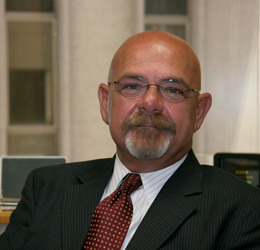Dwight Bassett has a big job. He’s responsible for figuring out exactly what Raleigh’s economic development goals look like and making sure they come to fruition. And right now, he’s a department of one.
Bassett, the city’s newly hired Economic Development Manager, held four listening sessions last week for business owners, involved citizens and anyone else interested in Raleigh’s economic future. In total, about 20 people showed up to the four meetings.

Dwight Bassett. Photo by City of Raleigh.
Bassett said the meetings were as much about introducing himself to the public as they were discussions of the various programs his office will create. Attendees had the chance to offer their own input on Raleigh’s economic priorities. Bassett also took an informal survey, the data from which will guide his direction.
In the three months Bassett has been on the city’s payroll, he has been trying to figure out how Raleigh became the city that it is today.
“Was it our intent to arrive at this destination?” he said. “What did we do to arrive here?”
Because this is the first time that the city has actively focused on economic development, Bassett believes there were a lot of economic factors that were out of the city’s control.
A big driver of the boom was Research Triangle Park, which drew thousands of people from around the country to high-paying tech jobs, he said. When the tech jobs came, all of the universities in the Triangle flourished and Raleigh rode that wave.
Now, Bassett is trying to figure out what those factors were and do them on purpose.
“I think we need to start thinking strategically about what we want to be,” he said.
A large part of his three months on the job has been trying to figure out in which economic direction Raleigh wants to go. For example, while the number of office and retail permits has increased, industrial permits have been declining for more than a decade.
If the city wants to continue with heavy industrial, like manufacturing, then Raleigh needs to be marketed as a place for that, Bassett said.
Out of the 40,900 businesses within Raleigh’s city limits, Bassett said that more than half of them have only one or two employees.
“That’s a massive opportunity for job growth,” he said.
He said if all of those businesses were to add 10 employees there would be a massive surge in the workforce. Bassett said the goal is to partner with those businesses to help them grow.
Another goal is to attract businesses to support the bigger tech businesses that are finding their way to downtown Raleigh. With Red Hat and Citrix staying in Raleigh and planning moves downtown, Bassett wants to know how to bring in the businesses that those companies do business with.
Bassett said he would also like to dive into Raleigh’s market data to figure out where the city is today before figuring out where it is headed.
Right now, Bassett is the sole employee in the city’s economic development office. The city has allocated $50,000 for some type of support staff position, but the details of that position have not been finalized. City Manager Russell Allen has a month to report back with his recommendations.
Because of the low turnout to the listening sessions, Bassett said that he is hoping to schedule another one in the fall. He said he will partner with the Chamber of Commerce, which may bring more people.
